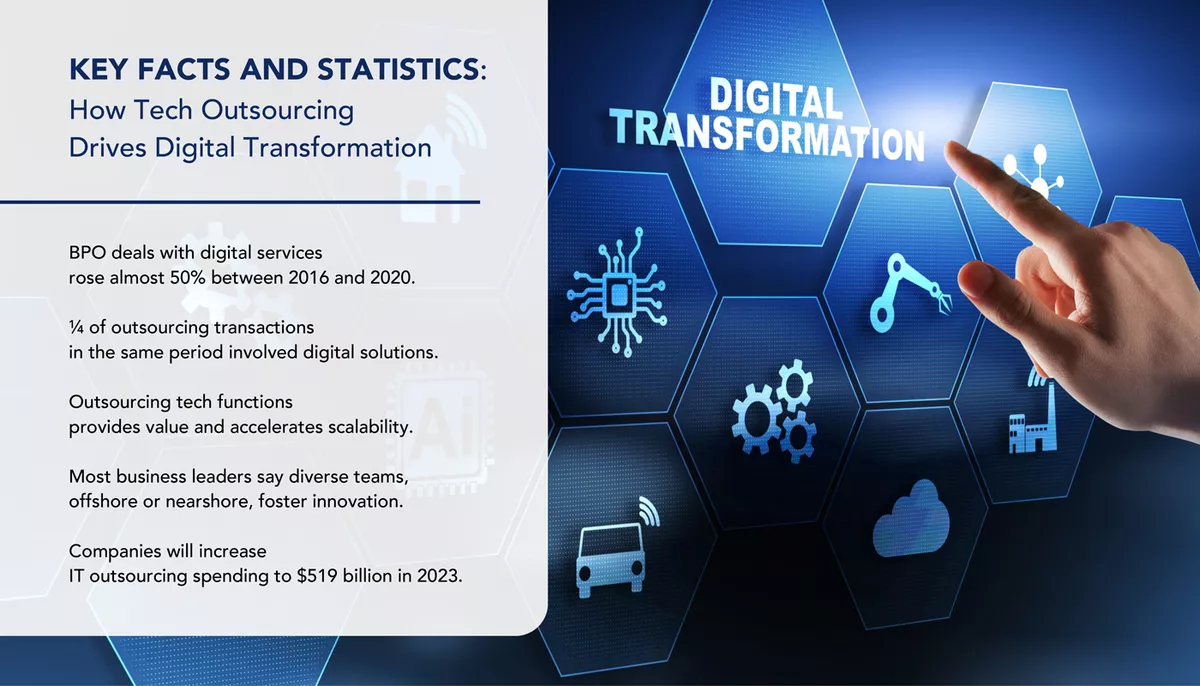
Businesses are navigating the Age of Digital Transformation. Companies, big or small, operate in an evolving tech landscape. Keeping up with the latest trends and innovations is vital to retaining their competitive edge in a tight global marketplace.
Indeed, digital transformation has become a popular buzzword. However, many businesses still do not grasp the concept and how it impacts daily operations.
To cope with the uncharted environment, leaders should leverage emerging technologies. This step is significant in streamlining operations, gaining insights into changing consumer behavior, and improving bottom line. With help from BPOs offering outsourced tech support, firms like yours can kick-start your digitalization programs right now.
This article looks at the ins and outs of digital transformation and how businesses can outsource tech jobs to accelerate their initiatives.
What Is Digital Transformation, and What Does It Mean for Businesses?
In recent years, “digital transformation” has become one of the most commonly used phrases in the business world. The problem is that the term remains vague, and many use it as a catch-all for various ideas and phenomena.
To be successful in their digital transformation initiatives, decision-makers must first understand what the term entails.
Transformations typically have an endpoint. For instance, a company hoping to improve its customer service ratings may stop making tweaks to its CS strategy once it has achieved its goal KPIs.
Digital transformation, however, is continuous. As technology evolves, companies must make long-term efforts to integrate each innovation into their operations.
So, what exactly does “digital transformation” mean? According to a McKinsey study, successful digital transformation initiatives must have these three key ingredients:
Value-Focused Strategies
The first ingredient for a successful digital transformation is value. Before incorporating any new technology into your company, you must ask yourself, “Which areas of the business will benefit most from digitalization?”
As much as possible, decision-makers must focus their digital transformation efforts on the domains that generate the most value for their company. Are there processes you can automate? Time-consuming functions you can expedite with technologies? Or, operations you can improve?
One example of a company that used technology to create value is John Deere. In the past, vehicle manufacturers competed on the quality of their combustion engines. However, with the rise of digital technology, automotive businesses began differentiating their products through software.
John Deere, a leading manufacturer of tractors and other heavy equipment, enhanced their brand’s value by incorporating state-of-the-art technology into its machinery, using an IoT ecosystem to provide digital services to customers.
Scalable Operating Models
In addition to focusing on value, companies must also pay attention to the scalability of their operating models when integrating new technologies into their business processes.
Think about it: If customers suddenly drive up demand for your products or services, will you be able to scale up your operations to keep up with them? Do you have enough qualified workers to operate the technologies and innovations in your day-to-day functions?
Successful digital transformations depend on bringing together your different departments and teams as you work together towards a common goal. Your digitalization efforts must scale your business to support hundreds or thousands of your workers without creating a new operating model.
Openness to Change and Innovation
Before the rise of digital transformation, companies often had a linear process for adopting technology, which started with gathering requirements, moved to testing, and finished with training the end users.
Today, however, digitalization has become a continuous and constantly evolving process. Businesses must regularly assess and analyze the efficiency and effectiveness of methods, keeping an eye on new tech solutions and opportunities, to maximize their full potential.
How Digital Transformation Drives Business Growth
Keep Pace With Evolving Customer Demands
Modern consumers have become increasingly reliant on digital technology. As such, they now expect their favorite brands to implement digital solutions to improve ease of use and convenience.
Suppose a customer finds it challenging to use your website or mobile app. They can click away and turn to competitors who can offer the user experience they’re searching for.
Businesses must prioritize digital transformation in all aspects of their buyers’ journey. The process starts from making it easy for customers to find their brand online to utilizing innovative service delivery methods.
Improve Operational Efficiency and Productivity
Beyond providing value to customers, digital transformation also offers significant advantages to your in-house team. By incorporating new technologies into your core business functions, you can begin automating and streamlining manual processes in critical departments like finance and human resources, reducing the workload of your employees.
As more companies embrace remote work arrangements, digital solutions have become crucial for communication and collaboration. Applications such as Slack, Microsoft Teams, and Zoom allow workers to assign and manage tasks between team members more quickly and effectively while enabling remote employees to form stronger bonds and work relationships.
Make Smarter Business Decisions
Today’s enterprises have access to a large volume of data owing to people’s widespread internet use. Qualified data analysts can transform this raw information into valuable insights that businesses can use to make more informed decisions.
By placing data at the center of your digital transformation initiative, you will no longer have to rely on guesswork or gut instincts. Instead, you can analyze patterns in your data to make accurate predictions about consumer behavior or improvements to your daily business functions and processes.
How Outsourcing Tech Jobs Can Drive Digital Transformation

In the past, businesses utilized outsourcing primarily as a cost-saving measure. Reducing costs is still a significant factor in many companies’ decision to outsource. However, advances in digital technology have now allowed BPO providers to support companies by offering more specialized and niche services.
In fact, according to McKinsey’s detailed analysis of outsourcing deals completed between 2016 and 2020, at least one-quarter out of 200 transactions involved digital solutions (social media, mobile app development, data analytics, or IoT). Additionally, the number of BPO deals that included digital services rose almost 50% over the same period, illustrating the tremendous growth in demand for digital transformation.
To understand outsourcing’s role in driving digitalization, let’s look at the “key ingredients” of digital transformation we mentioned in previous sections. With the right outsourcing provider, you can achieve successful digital transformation for the following reasons:
Outsourcing focuses on providing value and supporting your business strategies.
The main advantage of outsourcing tech support and other IT functions is that it provides value to your company, expanding your capabilities and assisting your core operations without overwhelming your in-house team.
The right BPO provider won’t just offer a one-size-fits-all solution; they will assess your current business models, identify your pain points and areas of improvement, and customize their outsourcing solutions to address your specific challenges and needs.
Outsourcing allows you to scale up your operations easily.
In addition to adding value, partnering with a BPO provider can enable you to scale your operations up or down, depending on your specific needs.
For instance, instead of taking the time to hire and train an in-house worker, you can accelerate your product launch timeline or other digital transformation initiatives by working with an existing outsourced IT professional.
Leveraging outsourced technical support services can give you the flexibility to adapt to a constantly changing business environment while keeping your operations running smoothly.
Outsourcing can bring change and innovation by allowing you to work with a global team of professionals.
To succeed globally, businesses of all industries must embrace diversity and its role in fostering innovation in the workplace. Today, more and more C-suite executives are realizing the power of diversity in developing new ideas and strategies.
According to a Forbes study, most business leaders say that having team members from diverse backgrounds encourages the sharing of different perspectives, which fosters innovation and positive change.
Similarly, working with an outsourced team outside your country’s borders can support your company’s diversity initiatives. Beyond leveraging their niche expertise, collaborating with offshore and nearshore professionals will expose your in-house workers to varying viewpoints and frames of reference that can help your brand thrive on a global scale.
Read More: Here’s Another Option For AI Development Outsourcing: Offshoring a Support Team From a BPO
Tech Outsourcing Solutions You Can Utilize for Your Digital Transformation Efforts

Information Technology (IT)
Information technology, or IT, uses computers, telecommunication platforms, and other digital solutions to support a company’s day-to-day operations.
As companies around the globe focus on their digital transformation initiatives, IT outsourcing has become a critical strategic investment. In fact, industry analysts predicted that companies would increase their IT outsourcing spending to $519 billion in 2023, rising by 22% compared to the previous four years.
Businesses rely on IT professionals to handle a wide range of roles, including the following:
IT Administrator
Administrators monitor, deploy, and operate a company’s IT ecosystem. Their duties include procurement, user training, software maintenance and upgrades, cybersecurity, and database management.
IT Technician
Technicians handle the maintenance of all computer hardware and software components used within the company, ensuring that all issued technologies function correctly and efficiently. When needed, they diagnose and repair any technical problems that arise.
IT Compliance Specialist
Enterprises of all sizes must follow various government and industry-specific laws and regulations when utilizing certain technologies. As such, IT staff are also responsible for ensuring that all tech processes, systems, networks, and security measures comply with regulatory requirements.
IT Security Specialist
As enterprises accelerate digital transformation, they become increasingly vulnerable to cyber threats, potentially impacting their confidential data and entire networks. According to Forbes, 82% of enterprises faced some form of cyber attack in 2022.
Thankfully, you can safeguard your operations by working with IT security specialists. These outsourced professionals are responsible for keeping your tech infrastructure safe by preventing, detecting, and addressing potential security breaches.
Tech Support Outsourcing
Do companies outsource tech support? The answer is a resounding “yes.” In fact, this is one of the most commonly outsourced IT solutions for many enterprises.
Through technical support outsourcing, businesses can assist customers whenever they need help using the company’s digital technology, products, or platforms.
Dedicated tech support agents work round-the-clock to answer technical questions, provide troubleshooting support, and gather information on common technical issues and bugs.
Computer Programmer
No matter your specific function or industry, you need relevant software and computer systems to perform your job. For this reason, computer programming, the process of writing code for computer systems, is essential for business success.
After receiving instructions from developers and engineers, programmers write source code (using programming languages like C++ or Java) to enable the computer systems to carry out specific tasks. They can program the software to process online orders, conduct online searches, merge databases, facilitate seamless communication, and perform other automated tasks.
Quality Assurance Tester
Before launching any new digital products, businesses must ensure that these are functioning correctly with the help of a QA tester. Whether dealing with a constantly crashing mobile application or a software glitch in new devices, QA testers work hard to solve all bugs before customers can see them.
Application Developer
Since businesses depend on software to accomplish work, they need reliable application developers to create and customize interfaces (such as APIs) that support and expand the company’s capabilities. These developers handle everything from e-commerce website development to building branded mobile apps.
Systems Analyst
In previous sections, we mentioned that digital transformation is an ongoing process that requires a constant reassessment of whether current systems are working or if there are improvements to be made. A systems analyst handles this process by studying existing IT systems, performing research, and providing solutions and recommendations to meet the company’s goals.
Outsource Tech Support to SuperStaff and Start Advancing Your Digitalization Efforts!
Are you ready to kick-start your company’s digital transformation initiatives?
SuperStaff is here to help.
As a people-centered and innovation-focused BPO company, we are passionate about helping our clients solve their most pressing challenges, including providing assistance as they navigate the complexities of digitalization.
By outsourcing tech jobs to us, you can support your core tech team, expanding their capabilities while reducing their overall workload. We can help you achieve digital transformation’s three “key ingredients” by focusing on value-driven strategies, providing scalable solutions, and driving innovation through diversity.
Connect with us today, and let’s discuss what our tech outsourcing services can do for you!






